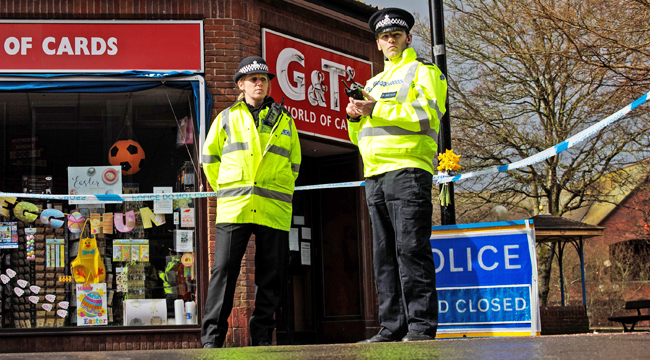
International fallout continues more than a month after the poisoning of an ex-Russian spy, Sergei Skripal, and his daughter, Yulia, on U.K. soil. A joint statement from British, U.S., French, and German leaders condemned the attack, and diplomats are being expelled from all involved ends. All the while, investigators have been working to determine how a military-grade nerve agent was placed in such a sophisticated manner after ruling out a suitcase planting occurring elsewhere. British authorities now say that the nerve agent was probably smeared on Skripal’s Salisbury doorknob, which makes it likely that the act was ordered by the Kremlin.
That is to say, this was not only a risky and sensitive method but also one that required a high degree of sophistication, given the potent nature of the poison. The assassins must have been trained in handling chemical weapons to escape unscathed, which means that this wasn’t a rogue attack. Further, the acquisition and deployment of the nerve agent is unlikely to have happened “without approval highest levels of the Russian government.” The New York Times points out that this is similar language to what the U.S. used when announcing that Putin must have ordered election meddling, and British PM Theresa May recently came close while accusing Putin of “weaponizing” elections.
Naturally, Putin has denied that Russia was involved in either the U.S. election hack or this poisoning, but the Times outlines British authorities’ analysis of the chosen method in attempting to murder Skripal. The assassins were well aware that the nerve agent would be identified as a military-grade agent connected to Russia. This was likely a warning shot to let ex-spies know that Russia could reach them anywhere, and here’s what that means regarding Putin:
The boldness of the attack on Mr. Skripal, which took British authorities by surprise, has caused them to reassess Mr. Putin’s use of what has come to be called “hybrid warfare.”
The officials are now viewing those actions as part of a pattern — one rarely seen in the Cold War — in which Mr. Putin exerts Russian power in ways that are hard to attribute directly to Russian actors, but leave little doubt in the minds of adversaries about the country’s willingness to use a range of new tactics.
Meanwhile, Sky News reports that Russian Foreign Minister Sergei Lavrov is floating a conspiracy theory that Britain could have poisoned Skripal in order to distract from the Brexit mess, which is a fairly brazen attempt to distract via a distraction accusation, no?
For now, it’s worth nothing once more that an inquiry into the 2006 murder of former KGB spy Alexander Litvinenko determined that Putin “probably” ordered the death by polonium-210 in London. And British authorities are growing closer to reaching the same conclusion with the attempted murder of Skripal.
(Via New York Times & Sky News)
